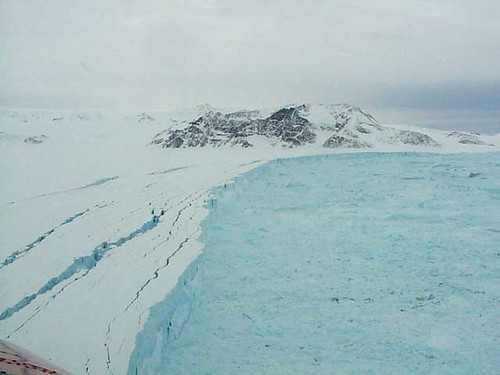The Intergovernmental Panel on Climate Change (IPCC) report [PDF] was just released to the public yesterday and already, it is being criticised by scientists for being "too optimistic". For example, the observed sea level rise has been following the upper range of the 2001 IPCC estimate. Thus, "It's pretty unequivocal" that the rise in sea levels is accelerating.
Other experts said the panel missed some important new developments, because it set a December 2005 cutoff date for submission of scientific papers and other data. Since then, researchers have reported that Greenland's ice sheet is melting faster than had been thought, that Antarctica is feeding more melt water into the oceans than had been predicted and that the melting of glaciers around the world is accelerating rapidly.
Climate experts have "a great deal of confidence" in observations that sea level rise is accelerating, said Laury Miller, an oceanographer at the National Oceanographic and Atmospheric Administration who was a reviewer for part of the IPCC report.
Good satellite measurements date only from the last decade or so, he said, so it is hard to draw firm long-term conclusions from them. Also, he said, computer models of how glaciers and ice sheets melt cannot account for much of the observed melting, even though "presumably it is going into the ocean."
A climate expert at Harvard, James McCarthy, who led the 2001 assessment with several of his colleagues, worried that unless the report's discussion of sea level rise was altered, the panel would so underestimate the problem that it would look "foolishly cautious and maybe even irrelevant" on the issue.
Cited story.
.


Here's one right up the great pictures alley you post here.:
http://www.earthsky.org/blog/50884/saturn-backlit-by-the-sun-earth-a-bi…
I think that it was a sensible decision to err on the conservative side, given all of the "contrarian" experts out to muddy the waters by picking their findings apart. The mathematics for accelerated melting of the ice sheets will be a bit more tricky than what they have been using for the sea level rise calculations. As it is, simple conversion errors were made in Table SM-0 of their "summary for policymakers."
The omission does present a tantalizing opportunity for someone to go out and collect that $10,000 prize!
RealClimate as usual, has some discussion on this issue.
Analyzing, describing, and summarizing a consensus is a difficult process - to me (as a nonscientist) it is not surprising that it would lag findings by over a year.
The 2006 findings about ice sheets are certainly important - but they are new and uncertain. Among other things, they require new dynamic models of ice sheets.
A Canadian newspaper just published an excellent series describing the details fo some reputed scientists who are now called "deniers" of Global warming. Well worth a read, to understand where they're coming from and whether the attacks against them are justified or simply ad hominem.
Part 10 of that article starts off with Shaviv's cosmic ray nonsense which has been throughly discredited .
Worse, it ignores the fact that the optical properties of CO2 have been well understood over a century, and their effects on climate have been skillfully modeled since the late 1980s. CO2 was not selected solely because there was no other mechanism.
Part 1 has lots of equally discredited guff about Wegeman's misunderstanding of Mann's 'hockeystick' paper.
Is there a reason I should read parts 2-9?
I apologize to Wegman for my earlier post (though it seems unlikely he has read it.) I was insufficiently skeptical of Solomon's claims about Wegman's views on global warming and the hockey stick papers.
desmogblog explains here that Solomon's piece misrepresents many of the scientists described in it; most are not deniers, though he claims they are.
In addition, RC has a fine piece on Wegman's testimony, here.